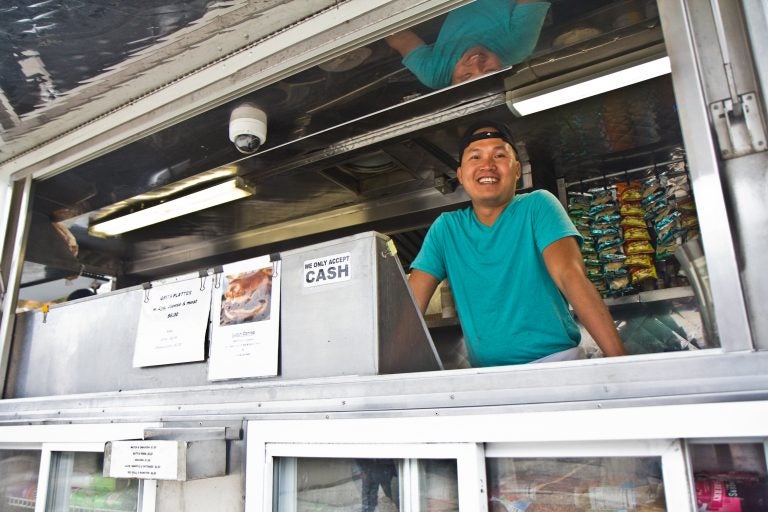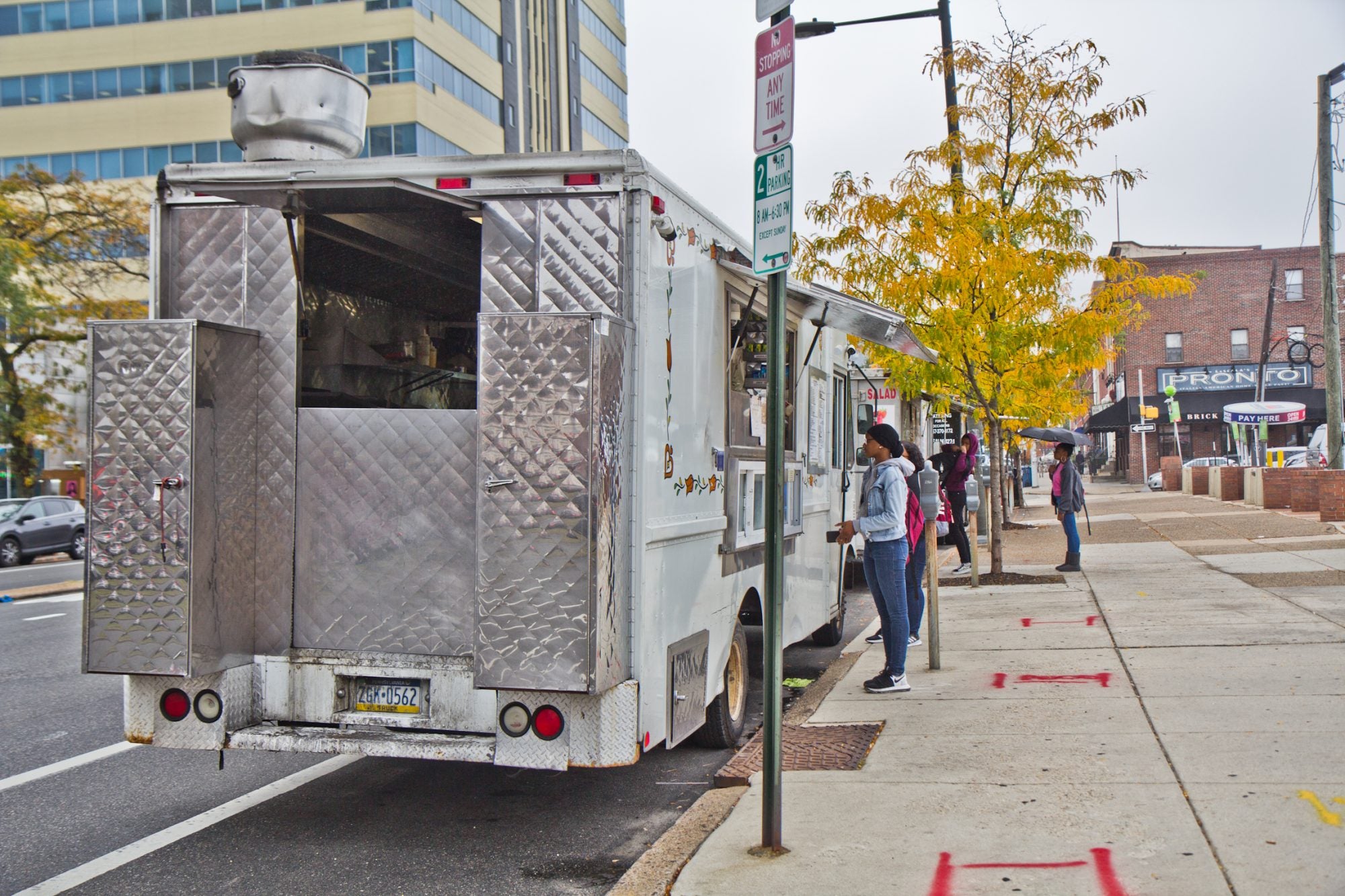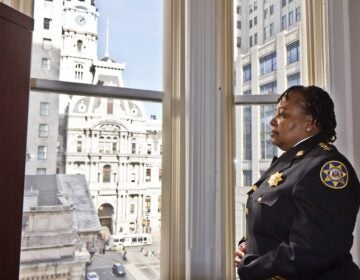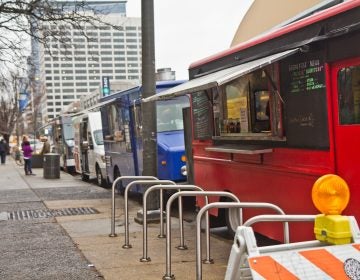Food cart owners say City Hall is pushing them out of Philly. Here’s why.
New restrictions from Philadelphia City Council are making business tough for many Philadelphia food carts.

Vu Ho is the owner of Ethan's Food Truck. (Kimberly Paynter/WHYY)
Mike Debesai slings breakfast sandwiches and hot coffee at the southwest corner of Broad and Spring Garden streets. He’s done it for more than 20 years.
The location is a lucrative one, next to the Spring Garden Broad Street Line stop and on the same side of the street as the Community College of Philadelphia. Five other food vendors operate beside Mike’s cart, and there’s plenty of business to go around.
“We’ve been here since 1998, most of us have. It’s like a community, a family,” Debesai said.
But there is a newcomer at the southwest corner of this busy intersection. Developer Bart Blatstein recently completed a one-story retail complex anchored by a CVS, right next to his Tower Place apartment building. The luxury apartments brought hundreds of new residents and the new shopping brought even more street traffic — growth that could help neighborhood entrepreneurs like Debesai. But in the case of the food vendors, the new development has generated the opposite impact.
“All of a sudden… We feel like we are fighting for our livelihood,” Debesai said.
How the food cart owners got to this point comes down to the power of City Council over public space and land use — a force that can help a business, or hurt one.
It all started with a move the vendors thought was temporary.
A constituent request for a move?
When construction began on Blatstein’s retail plaza last winter, concrete barriers went up on the south side of Spring Garden and the vendors moved to the north side of the street.
That put them four lanes of traffic away from the only full-service subway exit, and the streams of students and office workers who pour from it to maneuver west toward the community college.
The subway exit on the north side of the street is closed between 6:30 p.m. and 10 a.m.— cutting off the food trucks’ access to traffic during the morning rush when business peaks.
“We lost about 40% [of our business] because the community college students, they wouldn’t cross because they are always running late,” Debesai said.
CCP is also located on the south side of the street.
Debesai and his colleagues didn’t realize the move would last longer than the duration of construction.
It did. That’s because in April, after work on Blatstein’s retail building began, City Council President Darrell Clarke introduced a bill to ban street vendors on Spring Garden between Broad and 16th streets.

The bill became law in July. The food vendors say that no one told them about the new regulation. So when construction was completed, and the concrete barriers were removed last week, Debesai and his compatriots eagerly reclaimed their old spot.
But last Tuesday, the vendors say a Tower Investment representative confronted them and told them to move back across the street. The next day, an inspector from the Department of Licenses and Inspections told them they couldn’t operate on the corner.
When they still did not move, Debesai and his counterparts were hit with $75 tickets for operating in a prohibited area.
Clarke said last Thursday that he was surprised to hear there was any dissatisfaction with the law he authored.
“The construction that took place on that site has created a much more challenging pedestrian walkway,” Clarke said, echoing comments he made in the spring when the original legislation was introduced.
“I wasn’t aware they were complaining, but I don’t know why business would drop if they just moved across the street,” Clarke said. “Maybe it has something to do with the product. If you had a good product, I would think individuals would be prepared to go across the street.”
Clarke introduced companion legislation in October banning sidewalk sales between 16th and Broad streets on the south side of Spring Garden. A Council committee is slated to vote on the bill next week.
Blatstein declined to comment on the legislation and whether or not he requested the food carts be banned from in front of his new building.
Moving us out, putting Wawas in
Vu Ho is a Philadelphia resident and the owner of Ethan’s Food Truck, which has operated on that corner for seven years. His business took a 30% percent hit since the move, Ho said.
The entrepreneur feels like small businesses like his have no chance in the face of a tide of regulations designed to encourage real estate development and brick-and-mortar retail.
“We moved across the street and now that parking lot is being developed and they are going to chase us out again. We will have nowhere else to go,” Ho said. “They are moving us out and putting Wawas in.”
Earlier this year, Far Northeast Philly Councilman Brian O’Neill banned sidewalk sales in his district. The ban followed a similar move by City Councilman Bobby Henon’s predecessor. Between the two legislative moves, food trucks are now illegal across the sprawling Northeast.
Clarke’s spokesperson, Joe Grace, argued that it is not unusual for sidewalk sales and street vending to be restricted even in dense areas like Spring Garden.
“In the past, it’s happened further out along Spring Garden Street and 17th Street, near the Community College,” wrote Grace in an email. “Usually when vending is restricted, it’s because of a constituent request, so that isn’t unusual either.”
Grace declined to say whether Tower Investment requested the restrictions on commerce outside their retail complex.
The lawyer for the food vendors, Matt Monroe, says that they intend to engage the council president in a dialogue to get the new bill stopped and their original legislative loss rolled back. Clarke stated that he is willing to discuss the issue with the vendors.
For Debesai, the issue is one of basic fairness.
“We are trying to fight it. It’s the owner, Blatstein, versus working people,” Debesai said. “We are serving the public, working with the community and all of a sudden, why can’t we coexist?”
WHYY is your source for fact-based, in-depth journalism and information. As a nonprofit organization, we rely on financial support from readers like you. Please give today.







